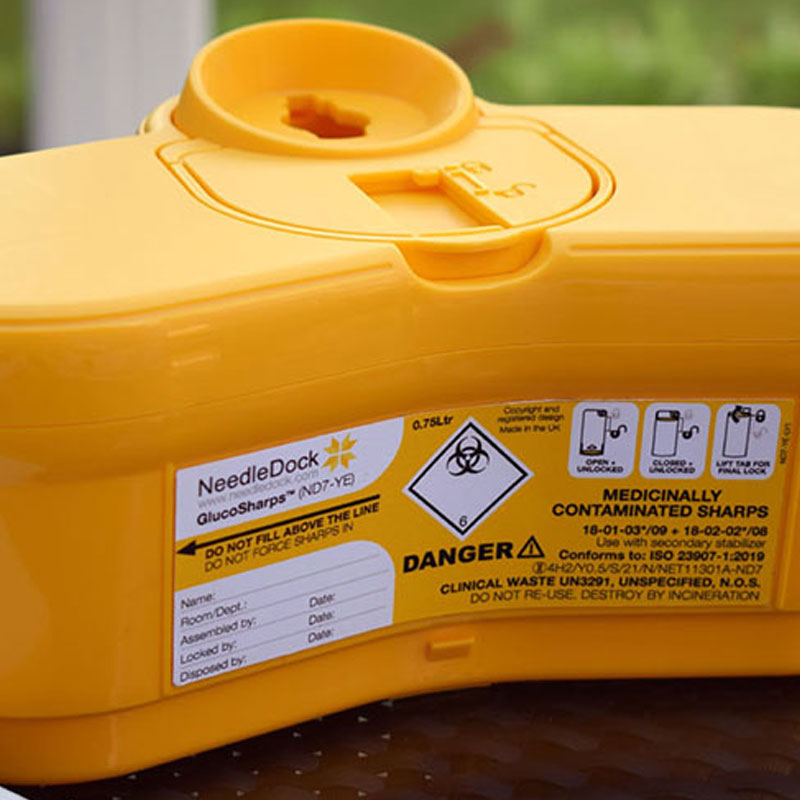- Home
- Welcome – Needledock case study
Welcome to Prototype Projects
NeedleDock case study
Eco needlestick injury prevention
Anyone working in healthcare is at risk of a needlestick injury. Research shows that needles account for hundreds of thousands of accidents each year, exposing the individual to potentially life-threatening blood borne diseases.
NeedleDock was developed to address the significant number of accidents that are caused as a result of needle disposal. These, often unreported, incidents present substantial health risks.
After extensive discussions with a broad range of healthcare professionals, the necessity for NeedleDock became apparent. Existing products were not meeting the needs of staff and simultaneously presenting them with an unnecessary and preventable risk in their workplace.
With involvement from customer feedback groups, hospital management and stakeholders, the NeedleDock team created an innovative and, most importantly, safe product, made for healthcare professionals.
Developing NeedleDock
The original concept was developed by Ady Nunn from West Suffolk Hospital in Bury St. Edmunds. It was quickly taken up and developed further by NeedleDock founders and R&D specialists, Chris Stanton and Paul Brown.
The idea is that the needle stick is inserted into the product – called NeedleDock – and is safely separated from the syringe. Unlike traditional sharps bins, by safely removing the needle, the risk of an injury is greatly reduced for healthcare professionals, ancillary staff and waste management operators.
This first product was launched at the end of 2020 and is sold internationally via a network of distributors to healthcare providers.
NeedleDock products have developed on from this initial product to further innovations, targeting the needs of other needle users. Several new products will come on stream in late 2021/early 2022.

Prototyping NeedleDock
With the CAD designs finished and intellectual property secured, Chris acted upon various recommendations when looking for a prototyping partner and soon approached Prototype Projects.
Chris said:
“It was an easy process with Prototype Projects. I met with Prototype Projects who explained the different technologies available and showed me a range of samples to demonstrate their ability to dye parts too.”
Chris wanted the prototype to closely resemble the finished product, and to be able to test the functionality of interchangeable parts.
The NeedleDock was 3D printed using SLA and SLS. The container was printed in clear SLA material on Prototype Projects’s ProJet 6000 machine. The lid and insert were printed using SLS; the lid was dyed yellow, while the insert was dyed purple.
Chris continued:
“The prototype looks like an injection moulded part and still sits on the shelf in my office.”

A positive reception
The NeedleDock prototype was printed and hand-finished in time for the Future Healthcare exhibition at Olympia London. The team received a positive reception and now sell the product via Amazon and international distributors.
Chris said:
“I was really pleased with the NeedleDock prototype produced by Prototype Projects. They have helped us develop a sustainable, needlestick injury solution that is not only good for staff safety and wellbeing but helps to reduce waste and cost in healthcare.”

About us
Prototype Projects, established in 1980, is a specialist in the manufacture of prototypes. We are experienced in 3D Printing, CNC Machining, Rapid Prototyping, Model Making and Additive Manufacturing. We’re located in Royston, Hertfordshire.
As a leading prototyping company we provide a completely integrated design-to-production service including, model making, rapid prototyping, 3D printing, finishing and additive manufacturing of production parts.
Request a quote
If you’d like to request a quote, click the button below.
To find out more about us and the services we offer, please read on.
Your parts. Your process.
We offer a wide range of 3D printing solutions as well as CNC machining & milling, vacuum casting and laser cutting.
- 3D Printing
- SLA – Stereolithography
- SLS – Selective Laser Sintering
- PµSL – Projection Micro Stereolithography
- DLP – Digital Light Projection
- CNC – Computer Numerical Control Milling (4 Axis) & Turning
- Vacuum Casting
- Laser Cutting
- Model Making
Your parts. Your speed.
3D Printing
We offer these dispatch options for 3D printing so you can have your parts at your speed:
- Express: next day dispatch if ordered before 4.30pm*
- Standard: in 3 working days
- Economy: in 5 working days
Click here to find out more about our service levels and dispatch methods.
CNC Machining
We offer these dispatch options for CNC machining so you can have your parts at your speed:
- Express: in 3 working days
- Standard: in 7 working days
- Economy: in 12 working days
Your parts. Your finish.
3D Printing
Depending on the purpose of the part, we offer a range of different finishing levels available on all 3D printing. Below is an overview:
Using our specialist graining process, SLS and SLA parts can be textured, giving them an ‘Off Tool’ look, such as leather or other natural materials. It is also possible to apply surface texturing to DLP parts.
We offer a consistent and repeatable SLS dyeing service, using our ‘Print-to-Product’ workflow. SLS parts can be precision dyed in virtually any colour. In addition to SLS dyeing, all models can be spray painted in our Paint Shop.
Click here to find out more about our 3D Printing finishing options.
CNC Machining
We offer an extensive range of finishing options for CNC machined prototype parts. Below is an overview:
Finishes can be applied for aesthetics or functionality – including EMI/RFI shielding on plastic parts – with the choice being heavily dependent on the base material.
We have in-house facilities for both wet painting and manual polishing. Other processes, such as anodising and powder coating, can be subcontracted to local specialists.
Click here to find out more about our CNC Machining finishing options.
